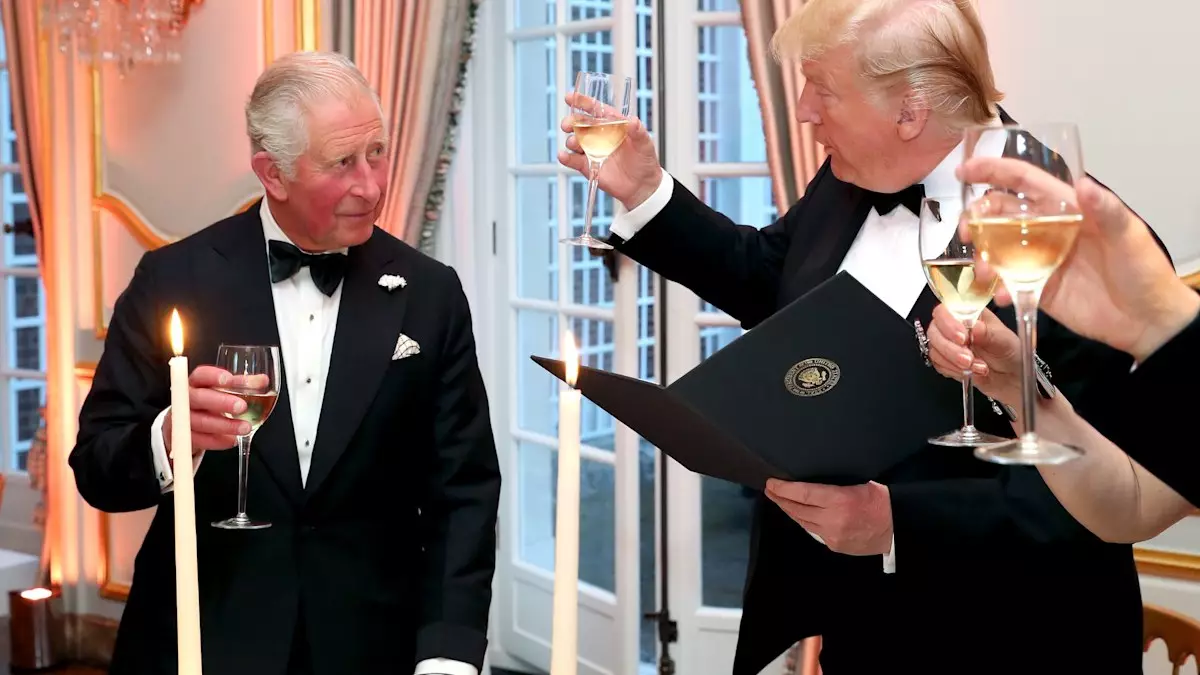Donald Trump’s second state visit to Buckingham Palace is set to take place in September, a development that speaks volumes about the evolving relationship between the United States and the United Kingdom. While it’s customary for a president to receive only one state visit during their term, the complexity of Trump’s political journey has led to an exceptional situation—one that demonstrates the unique rapport he has cultivated with the British monarchy. With Trump’s assertion that this event will be like no other, it beckons an examination of what this state visit might signify for both nations and how it reshapes traditional diplomatic norms.
The Significance of the Royal Invitation
When Donald Trump announced his forthcoming visit, he referred to it as a “fest,” underscoring not just the celebratory nature of the occasion but also the deep respect he claims to have for King Charles III and his family. This royal invitation is not merely ceremonial; it mirrors the underlying strength of the U.S.-U.K. alliance, one that dates back centuries yet is continually tested by contemporary political challenges. King Charles himself has always carried the torch of this transatlantic relationship, and by welcoming Trump for a second state visit, he is reinforcing the notion that diplomacy can transcend party lines and political ideologies.
Trump’s assertion that he views the invitation as an honor is telling. Note that his initial state visit during his first term took place in June 2019 under the backdrop of tumultuous political sentiments, both domestically within the U.S. and internationally. Fast forward to 2025, and it’s apparent that Trump sees this new visit as a chance to solidify his legacy, particularly in light of unpredictable geopolitical shifts. The invitation by British Prime Minister Sir Keir Starmer, delivered personally in the Oval Office, adds another layer of significance. It highlights a willingness on the part of British leadership to engage with Trump’s administration, despite divisions that could potentially arise from his polarizing rhetoric.
Trump and the British Monarchy
The relationship between Trump and the British royal family has often been analyzed through a lens of fascination and speculation. Known for his unabashed admiration of the monarchy, Trump has repeatedly expressed his fondness for its public figures, particularly during his public engagements. The common thread that weaves through their encounters is Trump’s genuine interest in the welfare of the royal family, expressed through his conversations with members such as Prince William. This rapport indicates a level of intimacy that goes beyond political pleasantries, allowing both parties to converse as allies rather than mere representatives of two nations.
In a recent reflection on a private meeting with Prince William, Trump reminisced about “warm and fond memories” of the late Queen Elizabeth II. This acknowledgment not only connects the present to a cherished past but reaffirms Trump’s belief that the royal family serves as a powerful symbol of continuity and stability in both British and American lives. In a world rife with discord, this mutual respect is a grounding force that binds the two leaders and their nations together.
What Lies Ahead?
As September inches closer, anticipation builds around the events planned for this state visit. Traditionally marked by grandeur and pomp, such visits often include high-profile banquets, meetings, and ceremonial functions steeped in history and tradition. While some critics may view Trump’s invitation as a controversial leap into uncharted territory, it is essential to recognize the broader implications for bilateral relations. The formalization of the event presents an opportunity for both nations to retreat from divisive politics and embrace the shared values that strengthen their partnership.
Moreover, this unprecedented visit opens the door for new conversations about alliances, trade relations, and global challenges. It invites an exploration of how political leaders can transcend ideological divides to work collaboratively towards common goals. Whether one views Trump’s visit as a necessary acknowledgment of past connections or a misguided step toward normalizing a contentious political figure, it is undeniable that the event represents a milestone in diplomatic history, one that will have lasting implications for an already complex legacy.
In embracing such unconventional pathways, leaders like King Charles and Trump express a hope for a future where diplomacy can still flourish amid chaos. Thus, as the world watches, the stage is all set for what promises to be another remarkable chapter in the annals of U.S.-U.K. relations.

